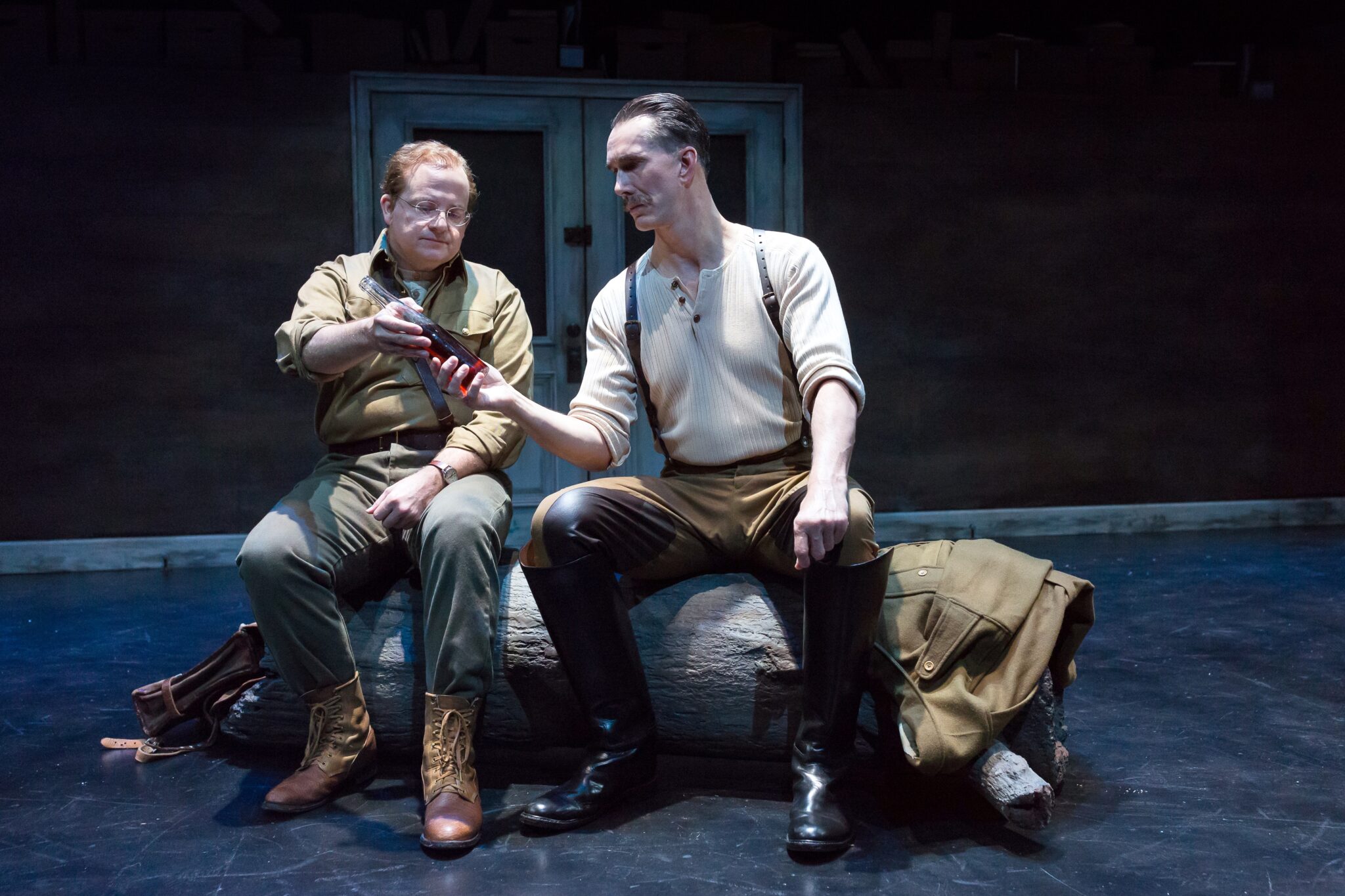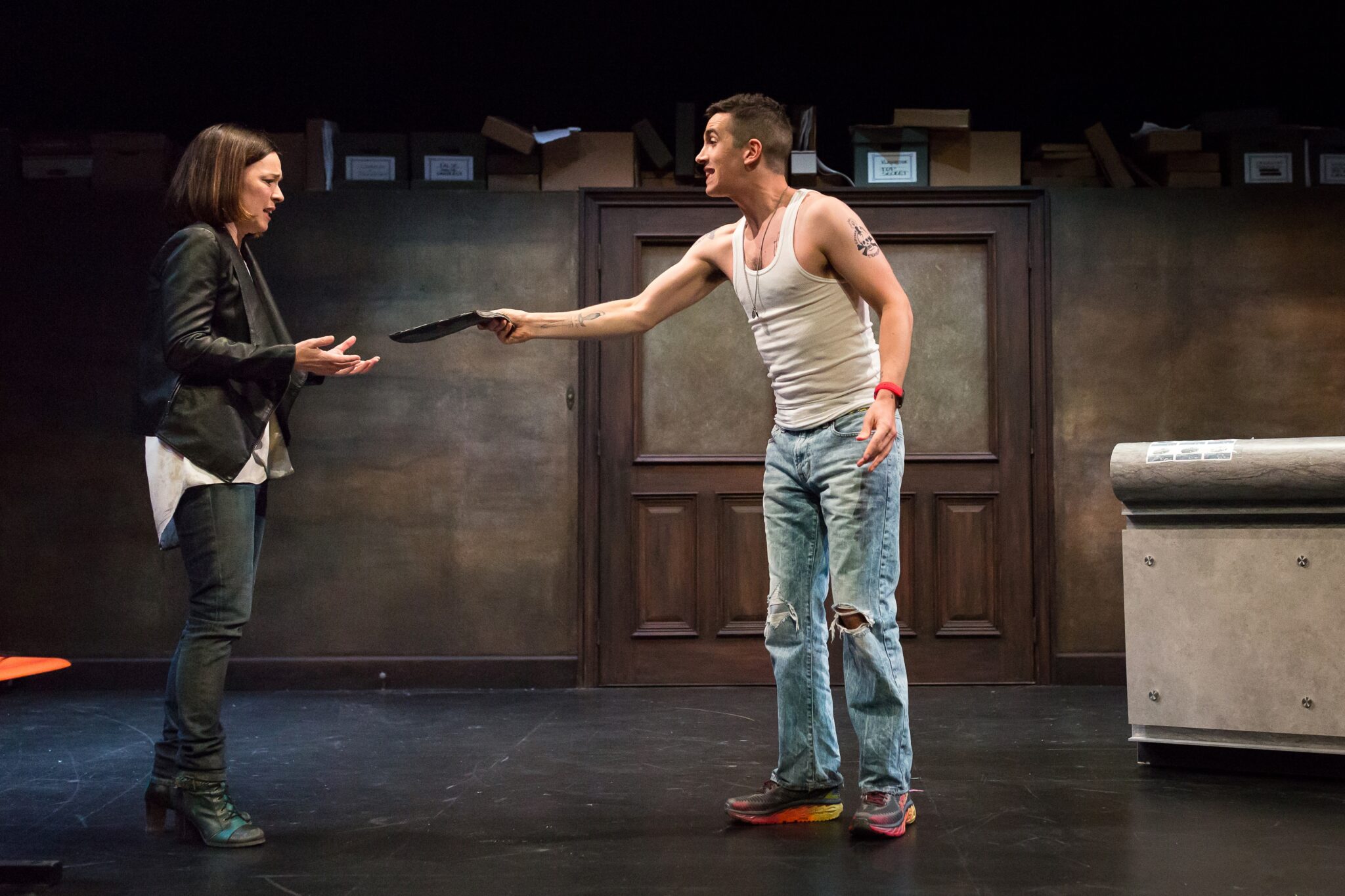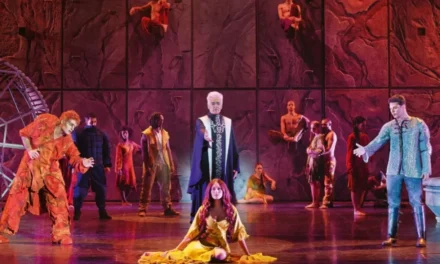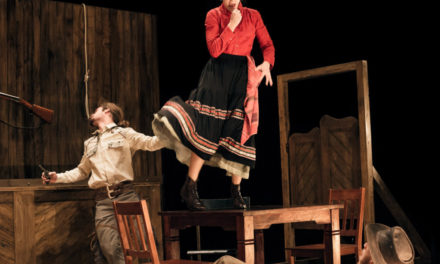As the floodwaters of Hurricane Harvey poured into Houston’s Alley Theatre on August 27, completely submerging the Neuhaus Stage, one thing was clear: the much-anticipated world premiere of Rajiv Joseph’s Describe the Night was in limbo. The production team had just completed load-in and soon thereafter was scrambling to put the pieces of the puzzle back together. Nearly everything had to be scrapped. The set, having been completely submerged in flood waters, had to be redesigned and completely rebuilt. And, more importantly, the Alley could no longer produce Joseph’s play in the Neuhaus, easily one of the city’s top theatre spaces. While the Alley canceled its annual production of The Santaland Diaries and moved the world premiere production of Lawrence Wright’s Cleo to April, Describe the Night relocated to the Quintero Theatre at the University of Houston. Even in the face of adversity, one thing was clear: the show must go on.
Describe the Night was commissioned by the Alley and was developed at New York University and the Alley All New Festival in February 2017. Giovanna Sardelli has served as the play’s director throughout development, continuing her work here in the world premiere production. Once the Houston production closes, Joseph and Sardelli turn their attention to the New York premiere at Atlantic Theater Company from November 10-December 24, 2017.

Jeffery Bean as Isaac and Todd Waite as Nikolai in Alley Theatre’s World Premiere of Describe the Night by Rajiv Joseph. Photo by Lynn Lane.
Describe the Night is an epic saga that spans 90 years in Russia, interweaving the stories of seven people drawn together by history, myths, and conspiracy theories. As Joseph tells Margaret Downing for Houston Press, “It’s three plays that intersect into one larger play.” The play begins in 1920; Isaac Babel, a Russian writer, travels the Russian countryside with the Red Cavalry. Seventy years later, as the Berlin Wall falls, a mysterious KGB agents spies on a woman in Dresden, eventually falling in love with her. In 2010, an aircraft carrying most of the Polish government crashes in Smolensk, Russia. While the three settings and time periods may appear disparate from a quick glance at the synopsis, Joseph shows his mastery of the craft by connecting these stories through a single journal.
Joseph drew inspiration for the play from the writings of Russian author Isaac Babel, who is prominently featured in the play. Speaking with Downing, Joseph notes how he became interested in both the writer and his life:
The more research I did on him the more I was interested in his relationship with in this guy Nikolai Yezhov, who was the head of Stalin’s secret police. It was interesting to me that this writer would be close friends with this man who was basically running Stalin’s purges. And the fact that Isaac Babel on top of that had an affair with the man’s wife.
Joseph connects Babel and Yezhov’s lives with the mysterious plane crash in 2010, which saw tensions between Russia and Poland resurface. Joseph finds a middle ground to link 90 years of Russian-Polish relations through a KGB agent, who is based on Vladimir Putin. In many ways, Describe the Night is firmly set in the past, but every so often Joseph’s work takes us back to the present.
Elizabeth Frankel, the Alley’s Director of New Work, spoke with Joseph shortly before the play began rehearsals. Frankel’s interview, published in the program, offers audiences a sneak peek into the new play development process. In the interview, Joseph comments on how the play has suddenly become timelier and even more political:
It’s as surprising to me as anyone else. I had no idea that I was writing something that would prove to be so timely and relevant. I’m interested in the politics of our age, current events and I’ve written politically in the past. For me, it’s always about finding a particular way into writing politically. I can’t just write a straightforward political play, not that those are bad. (…) when I approach political works, it has to be through a kind of slanted, shattered lens. That’s how I approached Bengal Tiger–from the perspective of a tiger. And I approached this in this kind of weird way and it just turns out to be relevant.
Aside from a critique of Vladimir Putin, Describe the Night addresses the issue of censorship in each of the plot’s narratives. In nearly each storyline, censorship leads to someone’s demise, whether it is a creative writer or a journalist. Joseph’s play shows just how far a corrupt government will go in order to keep its public image squeaky clean. In a time in which the President of the United States routinely criticizes journalists, questioning their motives and calling them “fake news,” plays such as Describe the Night are cautionary tales. Just how far will a government go to silence dissent?

Elizabeth Bunch as Mariya and Stephen Stocking as Feliks in Alley Theatre’s World Premiere of Describe the Night by Rajiv Joseph. Photo by Lynn Lane.
All of this is to say that Describe the Night is a must-see for Houston audiences. Yet, I question who has access. While the Alley normally offers ticket prices for nearly any theatre-goer’s budget, Describe the Night does not follow this norm. Seating is general admission and tickets are $55 for Tuesdays and $73 for Saturday evenings. Student, military, and senior discounts do not apply to this production (Note: the military discount code “works,” but the ticket prices are not reduced). While rising ticket prices are nothing new and the Alley certainly has to consider its lost revenue and $15 million renovation costs, it must be noted how cost prohibitive this production is. If I had not been given the luxury of press tickets, I would not have been able to see this play.
I say this because Describe the Night is a show that needs to be seen. Rajiv Joseph’s is one of the country’s top playwrights. He has consistently delivered with hits such as Gruesome Playground Injuries, Bengal Tiger at the Baghdad Zoo, and Guards at the Taj. In many ways, Describe the Night continues Joseph’s upward trajectory. But there is so much more to see in this production! For instance, Liv Rooth, playing Yevgenia from 1937 to 2010, steals every scene she is in, showing unmatched chemistry with everything in a 50-foot radius, from her fellow actors to leeches. Giovanna Sardelli’s direction keeps the production moving swiftly. I hardly felt the 3-hour running time.
Despite its successes, I left wondering what Describe the Night would have looked like in the Neuhaus. As the Alley continues the rebuilding process, it’s important that Houstonians continue to support the company. With damages reaching nearly $15 million, now more than ever, the Alley needs Houston. And, as Describe the Night demonstrates, Houston needs the Alley.
This post was written by the author in their personal capacity.The opinions expressed in this article are the author’s own and do not reflect the view of The Theatre Times, their staff or collaborators.
This post was written by Trevor Boffone.
The views expressed here belong to the author and do not necessarily reflect our views and opinions.


















